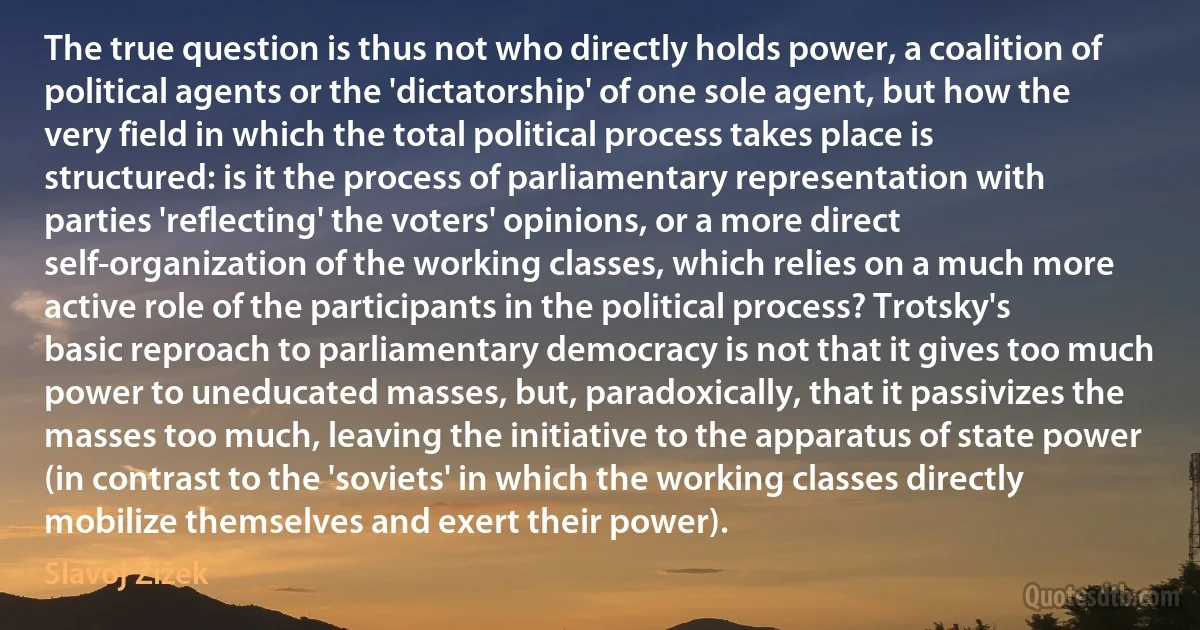
The true question is thus not who directly holds power, a coalition of political agents or the 'dictatorship' of one sole agent, but how the very field in which the total political process takes place is structured: is it the process of parliamentary representation with parties 'reflecting' the voters' opinions, or a more direct self-organization of the working classes, which relies on a much more active role of the participants in the political process? Trotsky's basic reproach to parliamentary democracy is not that it gives too much power to uneducated masses, but, paradoxically, that it passivizes the masses too much, leaving the initiative to the apparatus of state power (in contrast to the 'soviets' in which the working classes directly mobilize themselves and exert their power).
Slavoj ŽižekRelated topics
agent apparatus basic coalition contrast field gives initiative leaving mass parliamentary place power question reflecting representation state thus working self-organization sovietsRelated quotes
This blaming Westerners naturally extends into the field of scholarship. Thus, the evil of Indians aping Westerners is blamed on Westerners, including Orientalists, in that they are said to have deduced many Indian achievements from foreign sources and thus hurt Indian self-esteem. E.g., even now the Dutch Orientalist Johannes Bronkhorst derives Buddhist Abhidharma and debating techniques from Greek philosophy, just as many before him allotted a pivotal role to the Greeks in developing the best of Hindu civilization, including the Buddha statue and the culture of Mandirs (temples) and Murtis (idols). David Pingree and Kim Plofker derive much of Indian astronomy from Mesopotamia. They are probably wrong, but I would plead for their apoliticism and innocence.

Koenraad Elst
Of what use is it to please the herd? They are simply coarse animals - for all that is admirable in man is the artificial product of special breeding. We advocate the preservation of conditions favourable to the growth of beautiful things - imposing palaces, beautiful cities, elegant literature, resposeful art and music, and a physically select human type such as only luxury and a pure racial strain can produce. Thus we oppose democracy, if only because it would retard the development of a handsome Nordic breed. We realise that all conceptions of justice and ethics are mere prejudices and illusions - there is no earthly reason why the masses should not be kept down for the benefit of the strong, since every man is for himself in the last analysis.

H. P. Lovecraft
It is widely supposed that the naked human body is in itself an object upon which the eye dwells with pleasure and which we are glad to see depicted. But anyone who has frequented art schools and seen the shapeless, pitiful model that the students are industriously drawing will know this is an illusion. The body is not one of those objects which can be made into art by direct transcription - like a tiger or a snowy landscape. Often in looking at the natural and animal world we joyfully identify ourselves with what we see and from this happy union create a work of art. This is the process students of aesthetics call empathy, and it is at the opposite pole of creative activity to the state of mind that has produced the nude. A mass of naked figures does not move us to empathy, but to disillusion and dismay.

Kenneth Clark
What we demand from the Soviet architect is that, as an artist and because of his perceptive intellect, he will fully comprehend and amplify the faintest ripple of developing energies much sooner than the masses - who tend to be shortsighted as far as their own growth is concerned - and that he will transform this energy into tangible architectural form.. .The club's role is to become a University of Culture. If one accepts the premise that private dwellings should strive to operate on the basis of the greatest possible austerity, then by contrast, public dwellings should provide the maximum of available luxury accessible to all. The term 'reconstruction' is therefore not applicable to this case, since there is no building precedent in the past.

El Lissitsky
If you expect manners from modern newspapers you will be sorely disappointed in these democratic days. It is one of the blessings of modern democracy? If you were in America and did not give any interview, even then they would invent one? The press is a public institution; formerly, it was something dignified, but now the newspapers are the correct measure of the futility of human life.... It is the same with all other modern things... the press, the theatre, the radio; they drag down everything to the level of the crowd.... They succeed only if they can pamper the common man's tastes.... It is the same old question of the mass being pulled up by something higher. But, as it always happens, instead of being pulled up it is the mass that pulls everything down to its level....

Sri Aurobindo
